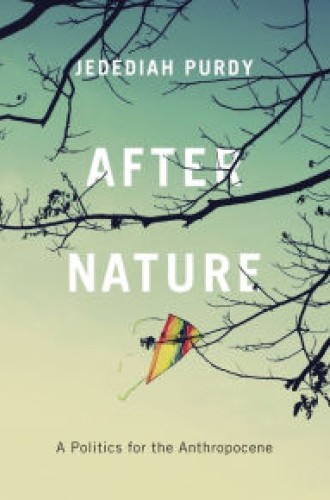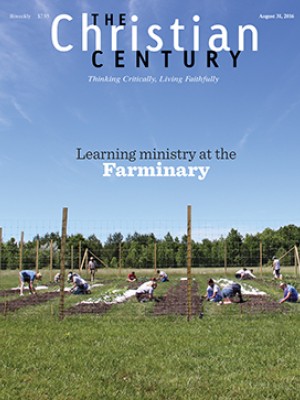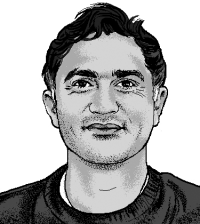Know the world, know yourself
Nature reveals itself as ruptured, as already profaned. To rest into a landscape is to be drawn into an adulterated history.
I follow Jedediah Purdy on Instagram. His pictures give the impression that he’s in love. There’s a shot of willow oak branches, the leaves oranged in the sunset light. There’s a portrait of the sky as a reflection on a pond, with ripples encircling a clump of bur-reeds. There are countless pictures, almost daily, of leaves—on a sidewalk, on the road, in his hand, floating in a puddle. My favorite picture is a selfie with Purdy bowed down on concrete, his body bent, his head turned to the sky and camera, so his bearded face can be a canvas for a splash of color from a rainbow.
To scroll through Purdy’s Instagram feed reminds me of what it was like in high school to collect photo booth strips, folded in a wallet, of a boyfriend or girlfriend. There’s affection. There’s devotion. There’s romance. Purdy loves nature; he loves the earth. He can’t help posting his snapshots, to show us his love.
Read our latest issue or browse back issues.
In After Nature, Purdy explores the “styles of environmental imagination” in the United States that inform our relationships with the earth in this era that is called the Anthropocene, the age of humans. He traces the development of these ideologies through varied sources—from the colonial journals of John Winthrop to recent rulings by the Supreme Court, with an assortment of material in between. Purdy’s brilliance is his ability to track conversations over time, to hear how one voice informs another, coalescing into a collective sensibility. He studies how an argument develops as one generation passes it along to the next, and he invites us to listen for how we reconfigure old ideas to make sense of our new world. To make sense of our world—that’s what fuels Purdy’s writing. To guide our sense of perception of the nature that infuses us. When he describes the credo of the Hudson River School of landscape artists in the 19th century, he might be describing himself: “The key was to learn to see, because seeing was not mere surface perception—it was insight. . . . The most successful painting would be true to vision, and would train the gaze of others.”
In this sense, to read Purdy’s book is a lot like scrolling through his Instagram posts: each chapter, each picture, is a window of insight to help us gaze at this world that he loves—without jealousy, because he wants us to love it, too. And Purdy is quick to add that knowing and loving the earth involves turning toward ourselves and giving an account of who we are. He follows Ralph Waldo Emerson’s axiom: “Know the world to know yourself.” To look inside ourselves is to see the world, and to see the world is to get a glimpse of ourselves. On Emerson he writes: “One considered the whole universe to illumine the self.”
This line of thought doesn’t lead to a narcissistic encounter with nature, as if the only reason we had for caring about the earth were a fascination with ourselves. Instead Purdy explores the ideas that shape our imagination in order to inspire our environmental politics. “The ideas about nature, God, and politics that we have been tracing were not just debaters’ topics or poetic decoration,” Purdy explains, paraphrasing Max Weber: “Ideas are not generally the engines of history, but they are its switchmen.” The conditions of our planet are bad enough that Purdy is looking for levers to pull us into a different future. “At inflection points, [ideas] can bank events off at one angle or another, with big consequences as time hurtles forward.”
One significant inflection point in this book is Henry David Thoreau, whose ideas about nature infuse our contemporary discussions. Thoreau wove the human self into the surrounding nature, all becoming part of the same fabric of life, “self-knowledge depend[ing] on connection to the natural world.” Romantic environmentalism claimed Thoreau as its prophet. For John Muir and his Sierra Club, the wilderness offered a multitude of experiences that were likened to Thoreau’s Walden. “The Sierra Club’s founders made Thoreau’s use of nature as a pilgrimage site the basis for a new movement and a new form of sociability.”
Purdy explains how the Romantics developed a politics of preservation to set apart land for camping and hiking, public territory protected from industry and population growth. While this version of environmental imagination preserved swaths of North American landscape, it also habituated the public into “segregating the natural world into a few cathedrals and vast tracts of profane land, with most of human life relegated to the profane regions.” In contrast to the Romantics’ reading of Thoreau as a transcendentalist who invited his readers to experience majestic epiphanies while on vacation in pristine nature, Purdy offers a Thoreau whose “ecological mysticism” inspires us as “natural creatures” to make a habitable world for all.
Purdy reads Walden as literature for the Anthropocene when he notes that Thoreau’s pond is not unspoiled nature, free from human contamination, but “a ruptured place.” Thoreau writes: “The wood-cutters, and the railroad, and I myself have profaned Walden.” Nature reveals itself as ruptured, as already profaned. To rest into a landscape is to be drawn into an adulterated history. “To come to the pond is already to profane it,” Purdy writes, “to think of nature, let alone act on it, is to make it a joint product of human and natural activity.” Thoreau for the Anthropocene confronts us with the reality that “profanation is simply the condition of the world,” an uneasy world where we work to undo the effects of our pollution and struggle to create habitable conditions for life. “The Anthropocene is a call to take responsibility for what we make, as well as for what we destroy.”
While Christianity isn’t a focus of Purdy’s research, he does account for foundational theologies that have informed American environmental imagination. For example, John Winthrop, governor of the Massachusetts Bay Colony, claimed “God’s special providence” for the European colonists who settled in North America. Winthrop and the colonists believed that God’s will was self-evident from nature—that the land itself offered God’s invitation for them to take and eat, a garden for them to cultivate, their own paradise. Providence, in secularized form, informs a popular tendency to use whatever is at hand regardless of the damage we cause, trusting that God or fate or luck will assure a future for human life generation after generation, despite our ecological neglect. However, Purdy writes, “no providence is overseeing our burning through the planet’s storehouses of energy and fertility—for they were not crafted as storehouses at all.” Instead Purdy wants “democratic responsibility,” where we make a world together, a home for all of us.
A video on Purdy’s Instagram shows a flock of chimney swifts, hundreds of birds swarming around an abandoned tobacco warehouse, then pouring themselves down into a smokestack. The building is a relic of an irresponsible past—nature damaged, human pollution, industrialism’s ruins. Yet Purdy notices the fragile beauty, a moment of Thoreauvian ecological mysticism, where we treasure the “places that are irremediably damaged” and learn “to prize what is neither pure nor natural, but just is—the always imperfect joint product of human powers and the natural world.” Everyday sites, profaned nature, reveal the beauty of this world. This is what Purdy imagines as an “aesthetics of damage, a way of living with harm and not disowning the place that is harmed, [which becomes] its own version of beauty.”
When I watch the chimney swifts I remember the words of Jesus: “Blessed are your eyes, for they see.” Purdy’s book invites us to see what he sees, to hear what he hears—to feel our way into an Anthropocene politics rooted in love for this world, our nature. This love is not delusional, whereby we hide ourselves from our impurity or from our damaged world. It is openness to who and where we are, love in the image of “the hand poised, extended in greeting or in an offer of peace.” This book is Purdy in love, an extension of his hands, opened to us and inviting us to share his experience of this natural yet profaned life that is our home.








